20 items found
Page 1 of 1
-
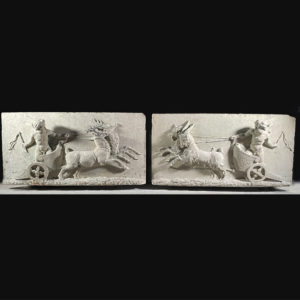
The Tehidy Plaques: a pair of George II carved limestone and lead relief-carved plaques
POAThe Tehidy Plaques: a pair of George II carved limestone and lead relief-carved plaques
each plaque, slightly coved in plan, carved in deep relief with a winged putto driving a chariot, on one tablet the chariot drawn by a pair of galloping stags (with original lead antlers), on the other goats; each putto raises a whip as they career towards each other,POA -
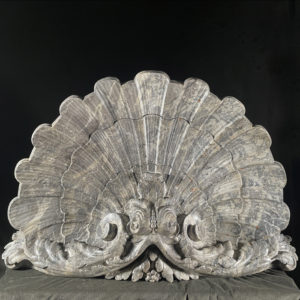
A carved Italian brechia marble scallop shell
£4,300A carved Italian brechia marble scallop shell
the fan-shaped undulating shell centred at its base with naturalistic forms concealing a grotesque,£4,300 -
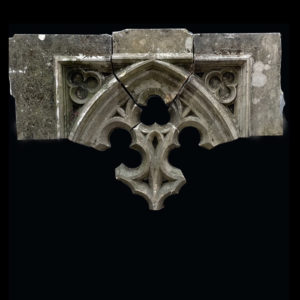
A Victorian Gothic carved limestone tracery window header
£2,650A Victorian Gothic carved limestone tracery window header
the double-sided lancet-arched window pierced with trefoil lights to the tracery and blind trefoils to the spandrels, the header in three sections with a fragment of tracery below,£2,650 -
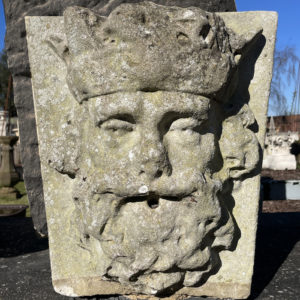
An English portland stone keystone carved with a portrait of a Plantagenet king
£860An English portland stone keystone carved with a portrait of a Plantagenet king
the bearded king with full beard and flowing locks and wearing a crown, weathered and mouth drilled for a spout,£860 -
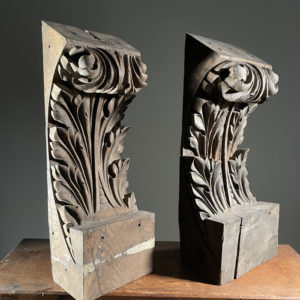
Two substantial English oak architectural carvings
£765Two substantial English oak architectural carvings
each coved corbel carved as a scrolled acanthus clasp, of different widths,£765 -
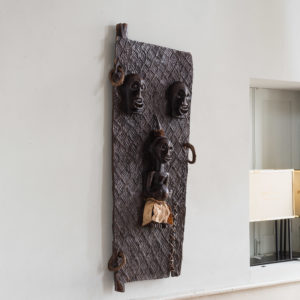
Congolese Songye door
£480 -
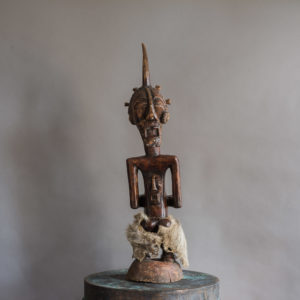
Songye Janus standing power figure,
£325Songye Janus standing power figure,
Congolese double-faced maternal power figure, adorned with animal hide and cowrie shells. The Songye power figure serves to protect its community from evil spirits.£325 -
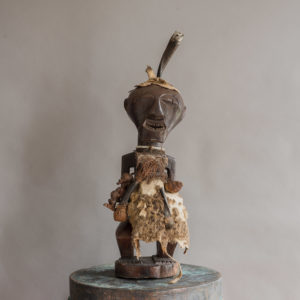
Songye standing male power figure,
£325Songye standing male power figure,
Standing male power figure from the Congolese Songye tribe, beautifully adorned with natural fibres, animal hide, and miniature power figure. These wooden power figures would have served to protect the Songye community from evil spirits and practitioners.£325 -
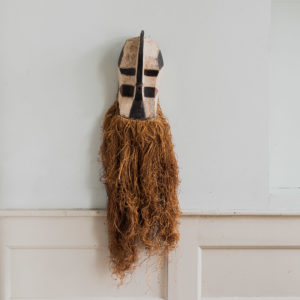
Songye Luba mask (A)
£280Songye Luba mask (A)
The people of Songye are mainly known as a farming community, however they also take part in hunting and trading with other neighbouring communities. The distinct Songye style is easily recognisable in the Kifwebe mask by the mass of closely carved lines and bold shapes such as the protruding sagittal crest and X carved mouth. The intertwining of the red, black, and white colouring in these masks are said to symbolise the struggle between good (white) and evil (black and red) - the combination of these colours embodying the positive and dangerous force held within the mask. The ruggedness of the Kifwebe mask and its long raffia beard are said to symbolise the underworld and the spirits that escape from it. Further, it is believed that the sagittal crest and conical protrusion contain the magical strength of the mask.£280 -
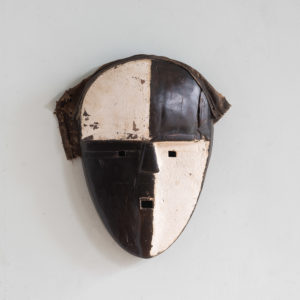
Kusu Nsembu mask
£250Kusu Nsembu mask
The Nsembu mask was used exclusively by members of the Nkunda Secret Society for the purposes of adult initiation and divination; the mask representing the diviners spirit. The chequered pattern may represent the interaction of opposites - day and night, man and woman, good and evil - within ones spiritual journey. It is also reminiscent of certain scarification practices. The Kusu people inhabit the Ituri rainforests, located in the northeastern part of the Congo.£250 -
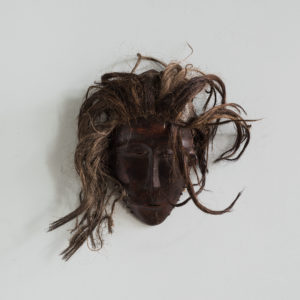
Tchokwe Pwo mask,
£245Tchokwe Pwo mask,
The Pwo is a classic Chokwe mask genre that honours their founding female ancestries as guardians of fertility and procreation. Chokwe masks were made and worn by men, often performed during the celebrations that mark a completion of initiation into adulthood and with means to honour women who had survived the difficulty of childbirth.£245 -
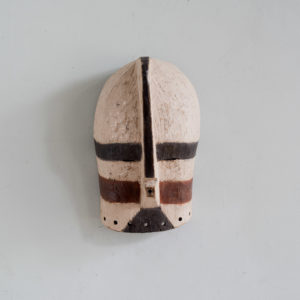
Songye Luba mask (B)
£200Songye Luba mask (B)
The people of Songye are mainly known as a farming community, however they also take part in hunting and trading with other neighbouring communities. The distinct Songye style is easily recognisable in the Kifwebe mask by the mass of closely carved lines and bold shapes such as the protruding sagittal crest and X carved mouth. The intertwining of the red, black, and white colours in these masks are said to symbolise the struggle between good (white) and evil (black and red) - the combination of these colours embodying the positive and dangerous force held within the mask. Further, it is believed that the sagittal crest and conical protrusion contain the magical strength of the mask.£200 -
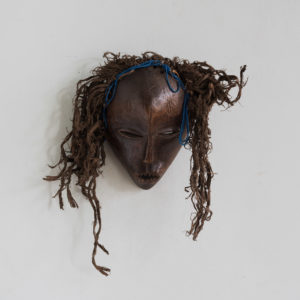
Tchokwe Pwo mask,
£195Tchokwe Pwo mask,
The Pwo is a classic Chokwe mask genre that honours their founding female ancestries as guardians of fertility and procreation. Chokwe masks were made and worn by men, often performed during the celebrations that mark a completion of initiation into adulthood and with means to honour women who had survived the difficulty of childbirth. Adorned with typical scarification designs to the face, with braided natural fibres alongside draped blue beads.£195 -
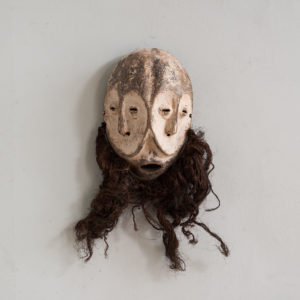
Lega Idimu mask (E)
£180Lega Idimu mask (E)
Similarly to the pipibudze masks of the Kwele tribe, the Lega’s Lukwakongo (miniature) masks have a heart-shaped face framed by a line formed by the nose, the eye rows and the planes of the cheeks. The wooden face is whitened and smoothed with kaolin clay, which is said to allude to the refined and perfected nature of the Bwami initiate, some of whom use the masks during initiation ceremonies. This mask would rarely be worn on the front of the face, but instead on the side of the face, the forehead, tied to the body, displayed on the fences, or dragged across the floor during Bwami meetings and ceremonies. The two faces share a mouth and a beard.£180 -
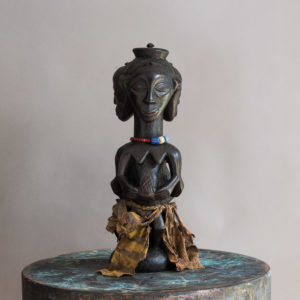
Luba-Hemba triple figural group,
£175Luba-Hemba triple figural group,
Triple maternal power figure with draped cloth fibres and checkered scarification to the belly and head. These wooden power figures would have served to protect the Songye community from evil spirits and practitioners.£175 -
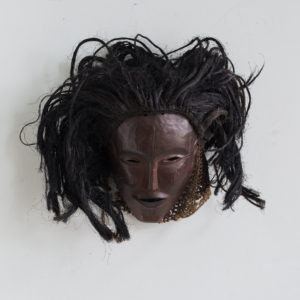
Tchokwe Pwo mask,
£175Tchokwe Pwo mask,
The Pwo is a classic Chokwe mask genre that honours their founding female ancestries as guardians of fertility and procreation. Chokwe masks were made and worn by men, often performed during the celebrations that mark a completion of initiation into adulthood and with means to honour women who had survived the difficulty of childbirth. Minimal scarification design to face and woven natural fibre covering.£175 -
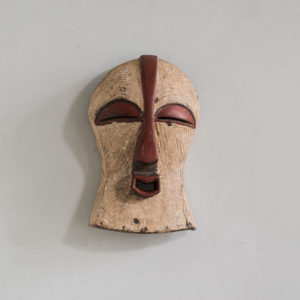
Luba Bilume Kifwebe mask (A)
£175Luba Bilume Kifwebe mask (A)
The people of Songye are mainly known as a farming community, however they also take part in hunting and trading with other neighbouring communities. The distinct Songye style is easily recognisable in the Kifwebe mask by the mass of closely carved lines and bold shapes such as the protruding sagittal crest and X carved mouth. The intertwining of the red, black, and white colouring in these masks are said to symbolise the struggle between good (white) and evil (black and red) - the combination of these colours embodying the positive and dangerous force held within the mask. Further, it is believed that the sagittal crest and conical protrusion contain the magical strength of the mask.£175 -
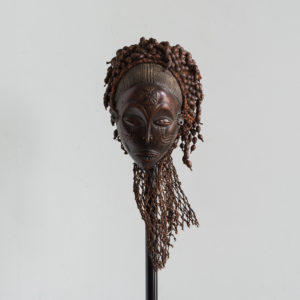
Tchokwe Pwo mask,
£165Tchokwe Pwo mask,
The Pwo is a classic Chokwe mask genre that honours their founding female ancestries as guardians of fertility and procreation. Chokwe masks were made and worn by men, often performed during the celebrations that mark a completion of initiation into adulthood and with means to honour women who had survived the difficulty of childbirth. The occasion is also said to mark the dissolution of intimate bonds between mothers and their sons, which may be represented through the tear carvings and motifs seen on the face. Further, facial scarification as seen on this mask would have been used to make the person less desirable to the spirit of death, and in women specifically would mark the birth of a baby boy.£165 -
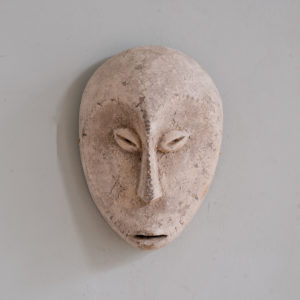
Lega Idimu mask (C)
£140Lega Idimu mask (C)
Similarly to the pipibudze masks of the Kwele tribe, the Lega’s Lukwakongo (miniature) masks have a heart-shaped face framed by a line formed by the nose, the eye rows and the planes of the cheeks. The wooden face is whitened and smoothed with kaolin clay, which is said to allude to the refined and perfected nature of the Bwami initiate, some of whom use the masks during initiation ceremonies. Any holes running around the lower edge of the mask would have held a beard made of natural liana fibres. This mask would rarely be worn on the front of the face, but instead on the side of the face, the forehead, tied to the body, displayed on the fences, or dragged across the floor during Bwami meetings and ceremonies.£140 -
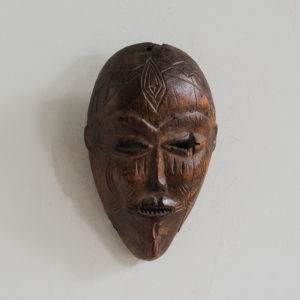
Tchokwe Pwo mask,
£125Tchokwe Pwo mask,
The Pwo is a classic Chokwe mask genre that honours their founding female ancestries as guardians of fertility and procreation. Chokwe masks were made and worn by men, often performed during the celebrations that mark a completion of initiation into adulthood and with means to honour women who had survived the difficulty of childbirth. The occasion is also said to mark the dissolution of intimate bonds between mothers and their sons, which may be represented through the tear carvings and motifs seen on the face. Further, facial scarification as seen on this mask would have been used to make the person less desirable to the spirit of death, and in women specifically would mark the birth of a baby boy.£125
Featured Items
-
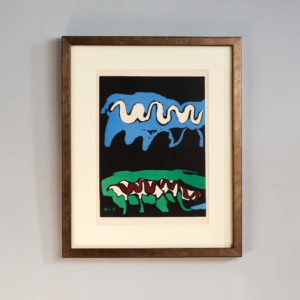
The Four Elements, Earth by Francisco Bores, Verve Vol. 1 / No. 1.
£600The Four Elements, Earth by Francisco Bores, Verve Vol. 1 / No. 1.
The Verve Review was a purposefully luxurious. It ran from 1937 to 1960, but with only 38 editions available, due to the high degree of design and editorial work dedicated to each issue. Each edition contained unique lithographic prints, commissioned by the editor, and each cover a double-page lithograph elaborated by one of the artists contained within. It was the brainchild of its editor Stratis Eleftheriades, a Greek National who moved to Paris in the early thirties to take part in the growing Modernist movement, writing under the name of Teriade.£600 -

The Dance, by Henri Matisse, Jan – March 1939 / No. 4.
£1,200The Dance, by Henri Matisse, Jan – March 1939 / No. 4.
The Verve Review was a purposefully luxurious. It ran from 1937 to 1960, but with only 38 editions available, due to the high degree of design and editorial work dedicated to each issue. Each edition contained unique lithographic prints, commissioned by the editor, and each cover a double-page lithograph elaborated by one of the artists contained within. It was the brainchild of its editor Stratis Eleftheriades, a Greek National who moved to Paris in the early thirties to take part in the growing Modernist movement, writing under the name of Teriade.£1,200 -
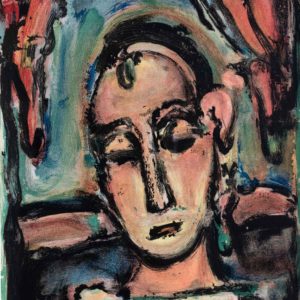
Head of a Girl by George Rouault, Verve Vol 2 / No. 5-6.
£800Head of a Girl by George Rouault, Verve Vol 2 / No. 5-6.
The Verve Review was a purposefully luxurious. It ran from 1937 to 1960, but with only 38 editions available, due to the high degree of design and editorial work dedicated to each issue. Each edition contained unique lithographic prints, commissioned by the editor, and each cover a double-page lithograph elaborated by one of the artists contained within. It was the brainchild of its editor Stratis Eleftheriades, a Greek National who moved to Paris in the early thirties to take part in the growing Modernist movement, writing under the name of Teriade.£800 -
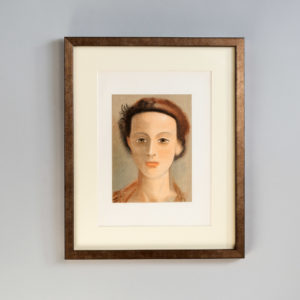
Portrait by Andre Derain, Verve Vol 2 / No. 5-6.
£800Portrait by Andre Derain, Verve Vol 2 / No. 5-6.
The Verve Review was a purposefully luxurious. It ran from 1937 to 1960, but with only 38 editions available, due to the high degree of design and editorial work dedicated to each issue. Each edition contained unique lithographic prints, commissioned by the editor, and each cover a double-page lithograph elaborated by one of the artists contained within. It was the brainchild of its editor Stratis Eleftheriades, a Greek National who moved to Paris in the early thirties to take part in the growing Modernist movement, writing under the name of Teriade.£800
